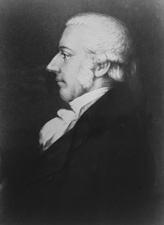Nicholas Van Dyke (senator)
| Nicholas Van Dyke | |
|---|---|
 |
|
|
United States Senator from Delaware |
|
|
In office March 4, 1817 – May 21, 1826 |
|
| Preceded by | William H. Wells |
| Succeeded by | Daniel Rodney |
| Member of the U.S. House of Representatives from Delaware's At-large district |
|
|
In office October 6, 1807 – March 4, 1811 |
|
| Preceded by | James M. Broom |
| Succeeded by | Henry M. Ridgely |
| 3rd Attorney General of Delaware | |
|
In office 1801–1806 |
|
| Preceded by | Nicholas Ridgely |
| Succeeded by | Outerbridge Horsey |
| Member of the Delaware House of Representatives | |
|
In office January 1, 1799 - January 7, 1800 |
|
| Personal details | |
| Born |
December 20, 1770 New Castle, Delaware |
| Died | May 21, 1826 (aged 55) New Castle, Delaware |
| Political party | Federalist Party |
| Spouse(s) | Mary Ann Leuvaneigh |
| Residence | New Castle, Delaware |
| Alma mater | College of New Jersey |
| Profession | lawyer |
| Religion | Episcopalian |
Nicholas Van Dyke (December 20, 1770 – May 21, 1826) was an American lawyer and politician from New Castle, Delaware. He was a member of the Federalist Party, who served in the Delaware General Assembly, as Attorney General of Delaware, as U.S. Representative from Delaware, and as U.S. Senator from Delaware.
Van Dyke was born in New Castle, Delaware, son of Nicholas and Charlotte Stanley Van Dyke. His father had been a member of the Continental Congress and a President of Delaware. The younger Nicholas graduated from the College of New Jersey, now Princeton University in 1788, studied law with his brother-in-law, Kensy Johns, and was admitted to the Delaware Bar in New Castle, in 1792. He married Mary Ann Leuvaneigh in 1792. They had six children, including Nicholas III, Kensey Johns, and Dorcas Montgomery and lived at many houses in and around New Castle. One of these was at the corner of Delaware and Fourth Streets and was the location of the 1824 wedding of Dorcas Van Dyke and Charles I. du Pont, which was attended by the Marquis de Lafayette. His farm and summer retreat, The Hermitage, was added to the National Register of Historic Places in 1973. The family were members of Immanuel Episcopal Church.
Van Dyke was a Federalist who was a member of the Delaware House of Representatives in 1799. From 1801 until 1806 he served as Delaware Attorney General. In 1807 he was elected to the 10th United States Congress to fill the vacancy caused by the resignation of U.S. Representative James M. Broom. He was reelected to the 11th Congress, and served in the U.S. House from October 6, 1807 until March 3, 1811. With the Federalists a powerless minority in Congress, he returned home to serve as the Attorney General of Delaware. Subsequently, he was elected to the Delaware State Senate for the 1816 and 1817 sessions. While serving there he was elected to the United States Senate and served from March 4, 1817 until his death on May 21, 1826. He missed the first month and a half of the 18th Congress, as his first term in the Senate expired on March 3, 1823, and he was not re-elected by the Delaware Legislature until January 7, 1824. He did not take his seat in the Senate for the 18th Congress until January 14, 1824, while the Senate had convened on December 1, 1823. He was Chairman of the Committee on Pensions in the 16th U.S. Congress.
...
Wikipedia
